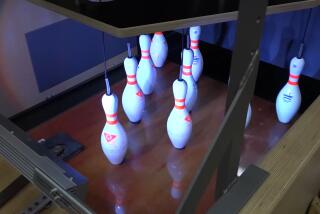Don Carter dies at 85; ‘Mr. Bowling’ was the sport’s original superstar
MIAMI — Don Carter, the bowling great with the unorthodox style who flourished as a genuine sports celebrity during the game’s golden age on TV, died Thursday at his Miami home. He was 85.
The Professional Bowlers Assn. announced the death of Carter, who had been hospitalized with pneumonia complicated by emphysema.
Carter, known as “Mr. Bowling,” was the game’s original superstar. He became his sport’s most recognizable name at a time when alleys were thriving across the country and bowling was starting to assert itself as a fixture on television.
He was a leading force in the formation of the PBA in 1958 and became a charter member of the PBA Hall of Fame in 1975.
Carter had a style all his own as he took his steps to the line. With his stooped shoulders and cocked elbow, he made a deep knee bend as he unleashed the ball as if pushing it toward the pins. He helped transform a sport that had been a blue-collar recreational activity.
“Don was the greatest bowler of his era,” Hall of Fame bowler Ray Bluth said. “There was no one like him.”
He also became the first athlete in American sports history to sign a $1-million marketing endorsement contract, with bowling ball manufacturer Ebonite in 1964.
“He was a pioneer, a champion and will never be forgotten,” said Tom Clarke, the PBA commissioner.
The 6-foot, 200-pound Carter bowled five 800 series, 13 perfect games and six 299s in sanctioned play
In 1970, he was inducted into the American Bowling Congress Hall of Fame. The same year Carter was selected as the greatest bowler in history in a Bowling Magazine poll.
Born in St. Louis on July 29, 1926, Carter was introduced to bowling on his 13th birthday.
He played amateur American Legion baseball with Yogi Berra and Joe Garagiola. After serving with the Navy during World War II, he signed a minor league contract with the Philadelphia Athletics as a pitcher-infielder. After a year, he returned to St. Louis and bowling.
Carter married LaVerne Haverly in 1953. After they divorced, he married Paula Sperber in the 1970s. Both women are in the Women’s International Bowling Congress Hall of Fame.
After retiring from bowling in 1972, Carter moved to Miami. He occasionally competed in pro-am tournaments in the 1990s, and he owned a chain of alleys and a line of bowling apparel.
In addition to his wife, Paula, Carter is survived by sons Jim and John, daughter Caycee, three grandchildren and five great-grandchildren.
More to Read
Start your day right
Sign up for Essential California for the L.A. Times biggest news, features and recommendations in your inbox six days a week.
You may occasionally receive promotional content from the Los Angeles Times.






